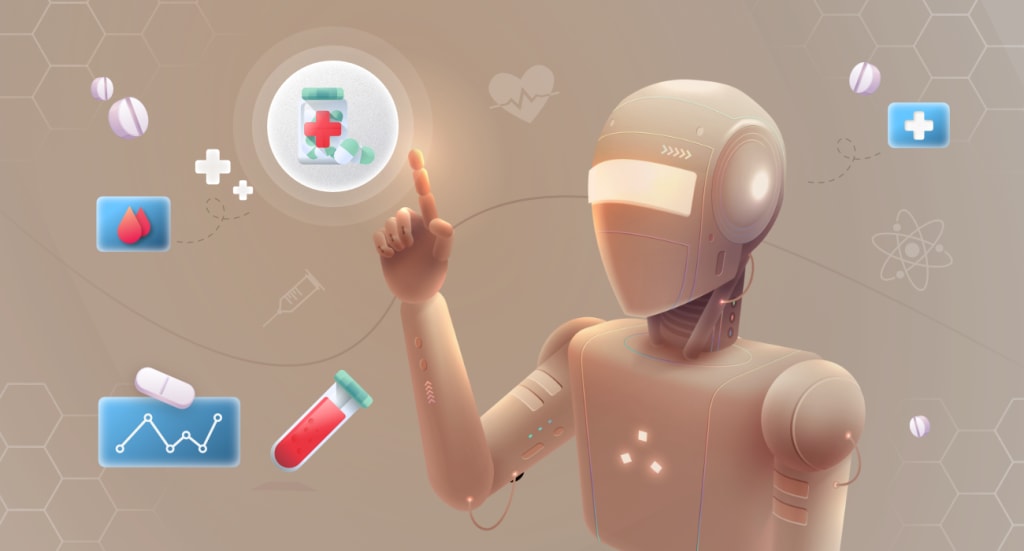
Medical technology powered by data science and artificial intelligence is quickly developing into practical clinical practice solutions. Deep learning algorithms can handle the growing volumes of data produced by mobile monitoring sensors found in wearables, smartphones, and other medical devices. Currently, only a relatively limited number of clinical practice contexts, such as the identification of atrial fibrillation, epileptic seizures, and hypoglycemia, or the diagnosis of disease based on histological examination or medical imaging, benefit from the application of AI.
Patients have been waiting for the deployment of augmented medicine since it gives them more autonomy and more individualized care. However, because they were unprepared for such a shift in clinical practice, doctors have been resistant.
Introduction to medical technology
The term "Medical Technology" is frequently used to refer to various instruments that can help medical practitioners diagnose patients earlier, prevent problems, optimize therapy and offer less intrusive options, and shorten hospital stays for patients and society. Before the advent of smartphones, wearables, sensors, and communication systems, medical technologies were primarily known as traditional medical devices (such as prosthetics, stents, and implants). However, with the ability to contain artificial intelligence (AI)-powered tools (such as applications) in small sizes, these devices have revolutionized medicine. Medical technology has undergone a revolution thanks to artificial intelligence (AI), a branch of data science with a wide range of applications with many facts but not much theory.
Many private medical schools are preparing their future medical leaders for the challenge of augmented medicine by either integrating digital health literacy and use into an upgraded curriculum or combining the medical curriculum with the engineering curriculum due to the need for more education in this field.
This blog aims to summarize recent developments in data science and AI in medicine and provide the prominent use cases where AI-powered medical technologies can already be used in clinical practice. It also provides perspectives on the difficulties and dangers that healthcare providers and institutions face when implementing augmented medicine, both in clinical practice and in the training of future medical leaders.
Artificial intelligence (AI) Applications in Medicine
Heart Disease Risk
AI has been utilized to predict the risk of cardiovascular illness, such as acute coronary syndrome and heart failure, better than conventional scales when applied to electronic patient information. For more detail on how AI helps heart disease prediction, visit the best data science course, and work on projects on the same.
Nephrology
Clinical nephrology has utilized AI in several settings. For example, it helps predict the decline in glomerular filtration rate in individuals with polycystic kidney diseases and determines the risk of developing progressive IgA nephropathy. However, a recent review points out that the sample size required for inference currently limits research.
Gastroenterology
Gastroenterology is a field that benefits from various uses of AI in clinical settings. The diagnosis of gastroesophageal reflux disease and atrophic gastritis, as well as the prognosis of gastrointestinal bleeding, esophageal cancer survival, inflammatory bowel disease, metastasis in colorectal cancer, and esophageal squamous cell carcinoma, have all been accomplished using artificial neural networks.
Challenges to Artificial Intelligence in Medicine and Its Future Directions
Validation of AI-Based Technologies: A Replication Crisis on the Horizon?
The clinical validation of recently created basic concepts and tools will be one of the main challenges of applying AI to medicine in the upcoming years. Several well-known and commonly documented constraints of AI studies are expected to make such validation more challenging, even though numerous studies have previously demonstrated the value of AI with clear prospects based on encouraging results. We'll discuss three of these restrictions and provide potential solutions in the following.
First, it has been discovered that most research comparing the effectiveness of AI with that of physicians has unreliable design and lacks primary replication, that is, the validation of the algorithms created in samples coming from sources other than the ones used to train algorithms. This challenge might be addressed in the era of open science because open data and open methodologies are destined to get more recognition as best research practices. However, medical AI businesses that focus on software development may find it challenging to make the switch to open science.
Second, studies describing the use of AI in clinical practice are known to be limited due to retrospective designs and sample sizes; such designs may include selection and spectrum bias, which refers to the development of models to fit a given data set as well as possible without replicating the same results in other datasets (a phenomenon known as overfitting). Software should require ongoing reevaluation and calibration following implementing algorithms that are considered overfitting to account for changes in patient demographics. Additionally, there is growing agreement that algorithms must be created tailored to accommodate bigger communities while also considering subgroups.
Third, few studies compare AI and clinicians using the same data sets; even in those cases, critics have noted that specialist doctors' diagnosis accuracy rates should be higher. The number of researchers is currently focusing on the interaction between clinicians and algorithms as the combination of human and artificial intelligence exceeds either alone, even though opposing AI and clinicians is extensively documented in the scientific literature.
Note: Check out the trending artificial intelligence and best data science courses available for working professionals wanting to upgrade their skills.
Ethical Consequences of Continuous Monitoring
One of the most promising markets of the twenty-first century is medical technology, which is predicted to have a market value of close to $1 trillion in 2019. The retail of medical devices (such as cardiac monitoring devices) to a younger population, which is not the primary target customer profile, is responsible for a growing portion of the income (because health problems such as atrial fibrillation are less likely to appear). This phenomenon has led to the Internet of Things (IoT) redefining what a healthy person is as a mix of the quantified self and many lifestyle indicators offered by wearable technology.
Education for Augmented Doctors: A Vital Step
In response to the need to prepare future medical leaders for artificial intelligence problems in medicine, several universities have begun to develop innovative medical curricula, including doctor engineering. In such a curriculum, the hard sciences (physics and mathematics) are approached more rigorously, and computer sciences, coding, and algorithmics are added. These "augmented doctors" would draw on their clinical knowledge and digital expertise to address the challenges of contemporary medicine, assist in developing digital strategies for healthcare organizations, oversee the digital transition, and instruct patients and colleagues.
These specialists serve as a safety net for all procedures, including the use of AI in healthcare, and a catalyst for innovation and research, which would be advantageous to society and healthcare institutions. In order to enable retraining in this expanding sector, ongoing educational programs relating to digital medicine targeted towards graduated physicians are therefore needed in addition to standard medical education. These professionals are tasked with carrying out the duties of the Chief Medical Information Officer in most cutting-edge hospitals worldwide (CMIO).
The Promise of Ambient Clinical Intelligence:
According to several studies, electronic health records can be a significant administrative burden and cause burnout. This condition is becoming more common among newly graduated and experienced physicians. Although artificial intelligence programs like Natural Language Processing are increasingly capable of assisting doctors in providing comprehensive medical records, new programs are required to address the issue of the growing amount of time devoted to indirect patient care.
The worry that medicine may become less humane is one of the significant obstacles to physicians using sophisticated medical technologies. This is primarily a result of the growing administrative burden placed on doctors. But modern tools like ACI and natural language processing will undoubtedly address the issue of administrative burden and let practitioners concentrate more on the patient.
Conclusion
A promising area of research and development is the application of data science and artificial intelligence in clinical practice, which is developing quickly alongside other cutting-edge disciplines like precision medicine, and genomics. Health policy should now be concentrated on addressing the ethical and financial challenges related to this pillar of the evolution of treatment. At the same time, scientific research should continue to be rigorous and transparent in creating new solutions to improve contemporary healthcare.
If you love to work in the medical field and want to shift your career to data science and AI, join the best data science courses in India today. Learn AI tools and techniques to work in top clinical firms.





Comments
There are no comments for this story
Be the first to respond and start the conversation.